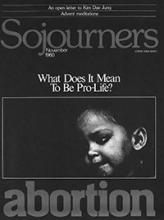Being pro-life is much more than being anti-abortion -per se; it means taking a stand against all powers, persons, and institutions militating against human dignity and the sanctity of all life. In their latest book, Whatever Happened to the Human Race?, Drs. Schaeffer and Koop are clear on this point: "Churches and other groups opposed to abortion must be prepared to extend practical help to...the unmarried woman who is pregnant....Merely to say...'You must not have an abortion' without being ready to involve ourselves in the problem is another way of being inhuman." This is where the work of a Crisis Pregnancy Center is crucial to a pro-life stance.
A pregnant woman (married or unmarried) with an unexpected pregnancy is in a tumultuous state and needs a clear point of reference from which to make decisions. Often she is pressured into the false belief that abortion is a safe and easy solution to her problem. She is not informed of the medical and psychological risks she takes or any positive alternatives to destroying her child. Emotions come upon her in a staccato fire: disbelief; fear as she realizes a living, growing being is within her; resentment of the bother and responsibility; and, finally, anger--she's not ready for a baby.
If a pregnant woman is already living under pressure she will tend to focus on her pregnancy as her major problem. In fear of judgment and rejection she hesitates to inform those closest to her. Aggravating the entire crisis are the rapid physiological adjustments of early pregnancy. Bouts of depression, high-strung nerves, and demoralizing morning sickness are not uncommon. A Crisis Pregnancy Center seeks to help women find the point of reference they need during this time of early pregnancy.
Read the Full Article

